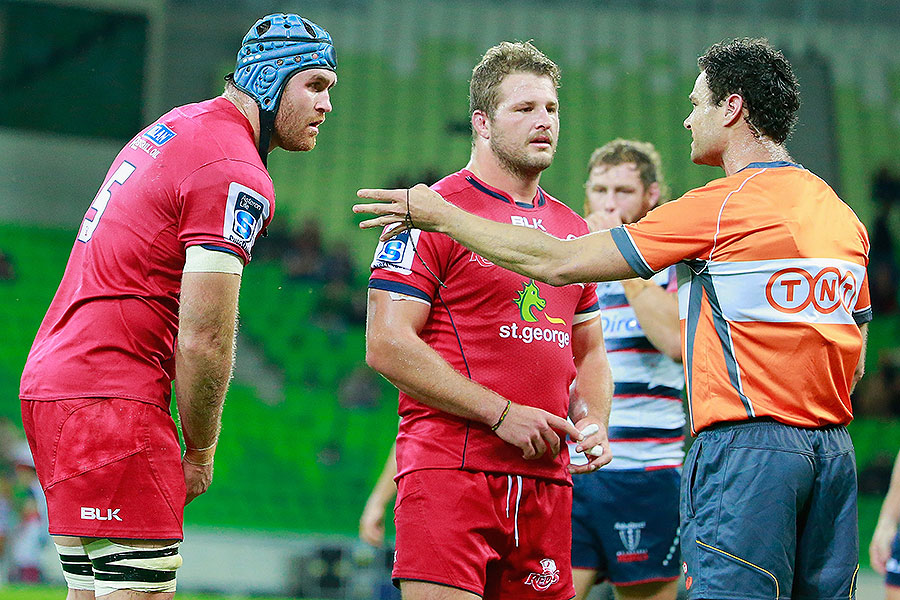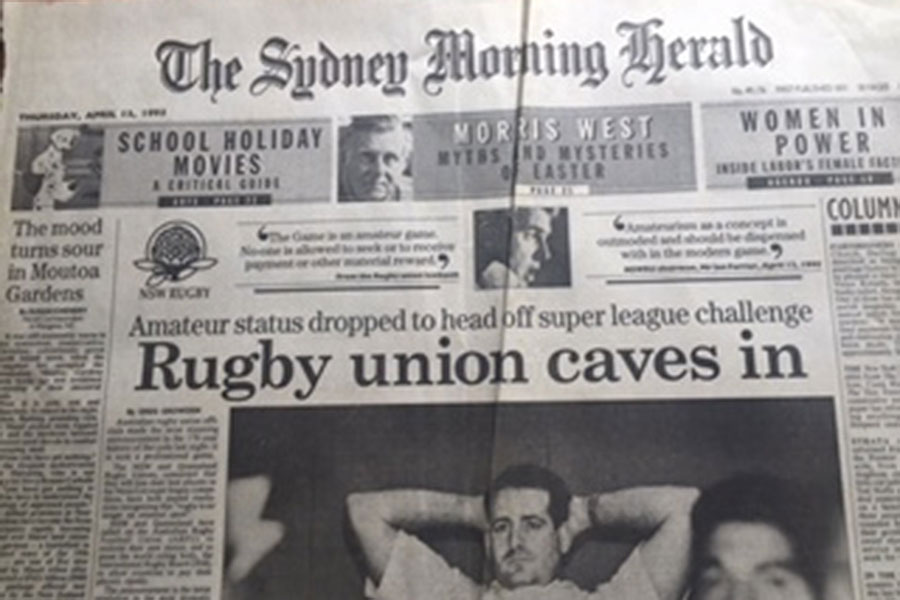|
Ruck'n Maul
Horwill 'nowhere near the run-on Test team'
Greg Growden
April 10, 2015
Ruck'n Maul: Liam Gill 'outstanding' but things going from bad to worse for James Horwill
The hopes of former Test skipper James Horwill being selected in the Wallabies' Rugby World Cup squad are getting slimmer by the day. Numerous on-field moments of ill-discipline, including two red-cards this season, have put Australia's 2011 World Cup captain offside with the Wallabies team management, in particular coach Michael Cheika. High-ranking Wallabies sources told Ruck'n Maul that Horwill is "at the moment considered to be nowhere near the run-on Test team" and will have to produce a dramatic lift in form to again find himself back in Wallabies contention. Even though the Wallabies lack a depth of quality and experienced second-rowers, Horwill now finds himself a considerable way down the pecking order for a tournament where discipline will be imperative. Queensland Reds' decision to fly to South Africa without him, even though he will have been available for the second tour match after serving a one-match suspension for belting Rebels prop Paul Alo-Emile, didn't help Horwill's case. While on the Reds, the push for their Super Rugby title-winning coach Ewen McKenzie to again be involved with the troubled organisation continues. One of McKenzie's strongest allies was sighted entering Reds HQ last week at a time when most of the staff were away. The person's identity would surprise many.

James Horwill received a second red card for 2015 against the Rebels last week © Getty Images
Enlarge
Australian Rugby professionalism hits major mark There won't be any fanfare, ticker-tape parade or ceremony. But an important rugby anniversary will occur on Sunday. Twenty years ago, Australian rugby officials made what was regarded as the most stunning announcement in the history of the code: it was now a professional game. On April 12, 1995, the NSW and Queensland Rugby Unions both passed resolutions recognising that "rugby is no longer an amateur game". Twenty years ago, the Australian rugby and league ranks were in a chaotic state. Australian Rugby Union officials were deeply worried their code could be decimated due to the push by Rupert Murdoch's News Corporation to establish a breakaway Super League competition. NSWRU chairman Ian Ferrier said that day that the union's board had agreed that "amateurism as a concept is outmoded and should be dispensed with in the modern game". QRU chairman John Breen provided a similar statement, stating that his board "formally confirmed its view that rugby was no longer an amateur sport". It was a public admission that rugby authorities in Australia were now prepared to openly offer players lucrative contracts in a bid to stop an exodus of talent to the 13-man code.

The day Australian rugby became professional, as reported by the Sydney Morning Herald © Getty Images
Enlarge
The rugby officials knew they then had to confront reality, because the game for some time at the top level had been "shamateur", with key players either receiving payments under the table or paid massive sums to play in the northern hemisphere. These statements did not lead to immediate peace in the ranks. Super League remained a threat, and a group of rugby entrepreneurs who had grandiose plans for the game was hovering in the background. Eventually emerging as World Rugby Corporation (WRC) the group was headed by former Wallaby Ross Turnbull, who wanted to take over the game. And for a short time, it appeared WRC would, luring many leading Australian, New Zealand and South African players to the rebel competition. A rugby war was looming. But after several chaotic months which included a disruptive 1995 World Cup campaign, the establishment finally regained control, propped up by News Corporation, which had signed a US$550 million 10-year Southern Hemisphere television rights deal. SANZAR was born. Super Rugby and Tri Nations football began, Rugby was a pay-TV product and players were paid far higher than anyone would have imagined. Rugby league officials target private school exposure Many aspects of rugby have changed in the ensuing 20 years. Some haven't. In 2015, as in 1995, rugby league still looks longingly at rugby talent. And as in 1995, rugby officials should be concerned by the latest league venture to sway the good players away. League officials have gone public in their ambition to introduce the sport into the Sydney Greater Public Schools, which for more than a century have been a prime breeding ground for Wallabies. While the GPS system has been a rugby domain, it has slowly fragmented - particularly with numerous leading private schools recently opting for AFL as well. Rugby League is also strongly followed by GPS students, and it would not take much for them to be lured into playing the 13-man code if it were on offer at their school. For too long, Australian rugby has taken GPS football for granted; if they don't try to protect it, they could easily lose the crucial schoolboy battle for talent. Super Rugby Preview: Round 9
%]Brumby's degree 10 years in the making Talking of persistence, Brumbies and Wallabies prop Ben Alexander has completed his sports media degree at Canberra University. The Canberra Times reported that Alexander began the degree in 2003 but study went "on the backburner" for some years due to important rugby duties. There were also trying times particularly when he started at uni, living on $10 a week when on campus. To save money, Alexander would buy loaves of bread and blocks of cheese to feed himself. Gibson appointment not all beer and skittles While there were no surprises when Daryl Gibson was named Waratahs coach, it appears there is a "little bit of tension" involving himself and a NSW official. Not everyone in Tahland was delighted with the appointment process. Gibson, who is well liked by the Waratahs players, has an enormous job next season, taking over from the larger-than-life Michael Cheika, who achieved Super Rugby title success. Gibson will need to perform, particularly as one of those involved in finding a NSW head coach was interested in luring a big name from another sport. But the proposed move didn't go past first base, as it would have meant a massive salary drop. 
Daryl Gibson (R) was not a unanimous choice at Waratahs HQ © Getty Images
Enlarge
Some players just can't let go Coaching can be an exasperating experience, especially among those who still believe they are as good as anyone out on the field. Former Wallabies winger Mark Gerrard is one of the Warringah Rats assistant coaches, and he couldn't resist running on and playing the last 10 minutes when they played Northern Suburbs late last month. Whispers of the Week
© ESPN Sports Media Ltd
|
Live Sports
Communication error please reload the page.
-
Football
-
Cricket
-
Rugby
-
- Days
- Hrs
- Mins
- Secs
F1 - Abu Dhabi GP
Abu Dhabi Grand Prix December 11-131. Max Verstappen ()
2. Valtteri Bottas (Mercedes)
3. Lewis Hamilton (Mercedes)
4. Alexander Albon ()
5. Lando Norris ()
6. Carlos Sainz Jr ()
-
ESPNOtherLive >>
Snooker - China Open
Tennis - Miami Open

